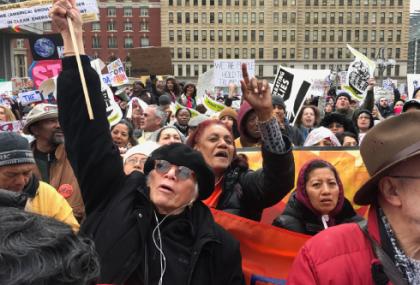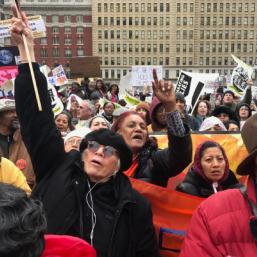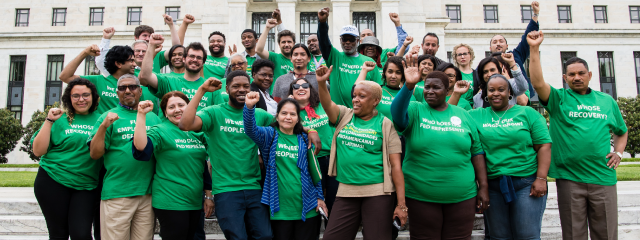Blog


On August 5, the Center for Popular Democracy and Make the Road NY (MRNY) released findings from a several months-long initiative monitoring the provision of language services for Limited English Proficient (LEP) New Yorkers. The results are stark: there are glaring gaps in language services in New York State, showing the significant failure of government agencies to provide language services needed to access critical state benefits.
In 2011, Governor Cuomo signed Executive Order 26, which requires state agencies with direct public contact to translate vital documents into the top six languages spoken by LEP individuals in New York State, provide interpretation services for all New Yorkers in their primary languages, develop a language access plan and designate a language access coordinator. Although communities and advocates applauded Governor Cuomo for taking this important step, the findings of the report, Language Access in New York State: A Snapshot from a Community Perspective, show that in the majority of cases New Yorkers across all regions are still unable to access language services agencies that administer state benefits and programs.
In Central New York, for example, Spanish speakers who requested written language assistance received it only 45% of the time, and in Buffalo that rate dropped to a meager 11%. The report documents similar problems with oral language assistance, with only 45% of research participants receiving oral assistance in their interactions with state agencies. One of the main reasons for the low compliance rate, the report finds, is that according to the state, the Executive Order does not extend to county-run agencies, even if those agencies administer state benefits. For the Governor’s order to have any real impact on the lives of LEP individuals, the state will have to address the problems with existing services, and especially the gaps in services at the county level.
CPD and MRNY worked in partnership with several local organizations to carry out the research for the report, including the Center for the Elimination of Minority Health Disparities (CEMHD) at the University of Albany SUNY, Multicultural Association of Medical Interpreters (MAMI) in Central New York and the International Institute of Buffalo.


Congratulations to our partners at Make the Road New York for their victory in the fight for green space. As a direct result of MRNY’s campaign against the privatization of public space, the US Tennis Association (USTA) committed $10 million to improving Flushing Meadows-Corona Park in Queens, which has long been an overcrowded and poorly maintained public space. The investment will be committed to park maintenance and programming with direct input by nearby residents.
While the USTA will expand their presence at the community park, the New York Times reports that the organization also agreed to “create an annual job fair for Queens residents and try to help local businesses benefit from the [US Open Tournament]. It will also help develop programs, like a community festival during the Open and low-cost tennis coaching for area families.”
We commend Make the Road New York for expanding access to green space for working class and low income-New Yorkers. Well done!


On the heels of House Republicans missing the Aug. 1 deadline to produce an immigration reform bill, immigration activists, labor union organizers, and faith leaders began “40 Days of Action,” a movement of civil disobedience that embody the frustrations of communities across the nation.
During the first action of the summer, protestors held hands in front of the U.S. Cannon House Office Building in Washington, D.C., declaring, "Undocumented, unafraid.” Other actions have included posting signs in the House bathrooms that read, “Employees must pass immigration reform upon returning to work” and meeting with Republican Congressmembers to engage in a dialogue about the necessity of immigration reform.
For a full list of actions, visit Alliance for Citizenship’s August Recess Events Schedule.


The Center for Popular Democracy is partnering with the Long Island Civic Engagement Table (LICET), New York Communities for Change (NYCC), and Make the Road Long Island (MRNY- LI) to offer a leadership training series to community leaders to build the power of the movement for lasting progressive change on Long Island. The training series takes participants through the nuts and bolts of politics and change on the island, strengthens skills in the fundamentals of organizing, develops leaders’ media competency, and shares strategies for civic engagement campaigns.
CPD has developed the curriculum for the Building Community Power series based on the best practices our organizers have collected from decades of work in working class and immigrant communities. Our most recent workshop, held Aug. 10, brought community members from across the island together to explore the fundamentals of grassroots organizing—from one-on-one relational meetings to recruitment and leadership building. Offered simultaneously in both Spanish and English, the training series provides a thoughtful and dynamic environment that engages community leaders on issues most important to the Island’s working families.
If you are on Long Island and interested in a training for your organization on one of our topics: Voter Registration, Recruitment and Leadership Building, One on Ones, Understanding Long Island, Direct Actions, Meeting Mechanics and Facilitation, Public Speaking, Media Training, GOTV, and Strategic Campaigns, contact Stephanie Yazgi at syazgi@populardemocracy.org and join us for the next installment in the series entitled “Media Skills & Getting Out The Vote” on Sept. 21 in Brentwood.


Last week, after months of advocacy, the Center for Popular Democracy and local partners in the fight for language access in New York celebrated Nassau County Executive Edward Mangano’s announcement that he will sign an executive order requiring County government to provide interpretation and translation services for the more than 130,000 Nassau residents with limited English proficiency (LEP). With this move, Nassau joins a growing number of state and local governments that have adopted policies expanding language access services for their LEP populations. The executive order will bring the county into compliance with Title VI of the Civil Rights Act—which prohibits discrimination based on language.
Language barriers make it difficult for immigrants and other LEP New Yorkers to take advantage of a wide range of services and benefits that are important for the basic health of their families as well as the broader community. Without interpretation and translation services, it can be difficult or impossible for LEP individuals to obtain a driver’s license, obtain child support, seek the assistance of local police or participate in political life.
In advocating for this policy, CPD was part of a strong coalition of local organizations including the Empire Justice Center, the Long Island Civic Engagement Table, Long Island Jobs with Justice, Long Island Advocates Coalition, Make the Road New York, New York Lawyers for the Public Interest, New York Civil Liberties Union, and New York Communities for Change. The coalition’s hope is that this is the beginning of a movement not only in New York, but in states and municipalities across the country, to improve language access services as a way to welcome, support and integrate LEP individuals and communities.


In the wake of the Zimmerman verdict, President Obama gave an emotional speech denouncing racial profiling and declaring, “Trayvon Martin could have been me 35 years ago.” A few days later, the President told press that New York City Police Commissioner Ray Kelly – the man responsible for New York City’s racially divisive Stop and Frisk program – would be “very well qualified” to lead the Department of Homeland Security.
In response, CPD has launched this petition to urge President Obama NOT to appoint Commissioner Kelly to run, among other programs, our nation’s entire immigration system.
Under Commissioner Kelly, New York City’s Stop and Frisk program has seen the number of people stopped rise from 100,000 in 2002 to nearly 700,000 in 2011. Of the individuals detained, questioned, and frisked, almost 90% of them have been Black or Latino. The vast majority of those stopped have been innocent of any crime and less than 2% of these racially-charged stops have recovered any guns.
President Obama’s support of Commissioner Kelly is not only undeserved, it’s insensitive in the wake of the George Zimmerman verdict. We cannot let a man who believes so strongly in racial profiling run our nation’s immigration system.
Please join us in calling on the President NOT to appoint Ray Kelly to lead the Department of Homeland Security.
Please sign our petition today and urge friends and colleagues to do so as well.


Workers at an Olivet International warehouse in Mira Loma, CA, a key facility for Walmart’s luggage production, went on a two-day strike last week to protest against extreme intimidation, spying and retaliation, as well as exposure to unsafe working conditions. Among the workers’ concerns of dangerous working conditions were blocked fire exits, pitch black work spaces, frequent falling towers of boxes, and lack of access to water and sanitary bathrooms. Workers also raised compensation concerns during their strike--the majority of workers at the Olivet warehouse are paid less than $200 a week, denied full-time positions, and receive no health benefits.
In solidarity with the striking workers and directed by New Labor, the Center for Popular Democracy and the Center for Third World Organizing hand-delivered a letter urging Olivet International to respond to workers’ concerns of unsafe working conditions, extremely low wages and intimidation at their Mira Loma warehouse. The letter demanded Olivet stop illegally retaliating against workers and allow the strikers to return to work.
On Friday morning, WWU reported that every striker successfully returned to work. Workers won national attention, international support and spoke directly to Walmart about retaliation and unsafe working conditions. We congratulate the striking workers and their families for bravely walking out of the job and demanding fair workplace conditions.


CPD and the Workers Defense Project recently launched a collaboration to develop organizing to scale in Texas. WDP has successfully built up a member base of over 1,000 workers in Austin, TX and is expanding its membership to Dallas.
Each year, WDP serves thousands of individuals through its wage claim and injury work, workers’ rights education, ESL, leadership, and computer classes. WDP is now looking to “scale-up” to organize more workers and win even more victories while solidifying its current leadership and member base. Together, CPD and WDP are refining WDP's programs to expand membership participation, retention and growth, and to develop new leaders. We are working to create an organizational structure and management systems to foster WDP's growth and support the organization's goal to be a powerful voice for workers in a historically anti-worker state.
An element of this strategy will be to leverage the legalization process, if immigration reform is enacted, as a vehicle for building the membership and capacity of WDP. In particular, CPD is working with WDP to develop an ambitious, multi-state project that will facilitate access to non-predatory legal and financial services for thousands of immigrant families, generate significant new revenue streams for the community-based organizations that serve them, including WDP, and build capacity and infrastructure for the field of immigrant worker organizing. Through this project, CPD will coordinate and support partners such as WDP to build direct services capacity and leverage technology to meet the immediate need for naturalization-related information and services, simultaneously helping build organizing and organizational capacity.


CPD is proud to support the national movement for comprehensive immigration reform through targeted campaigns in two important states: New Jersey and Pennsylvania. Our organizers have been focused on coalition building and voter mobilizing in states with large immigrant populations. We have been working with partners on the ground to galvanize support for reform among local elected officials, faith leaders, and labor unions, and to move congressional representatives to vote for comprehensive immigration reform.
In New Jersey, our organizers have been working in five key districts helping partner organizations develop a strong and unified message and assisting with a series of congressional call-in days, press conferences, and legislative visits. The aim of these efforts is to demonstrate to congressional representatives the overwhelming level of support for reform.
In neighboring Pennsylvania, the Lehigh Valley is a key swing congressional district and its large immigrant population would benefit immensely from federal immigration reform. CPD has been able to support a new committee of grassroots community leaders with trainings and workshops and, alongside Allentown’s Mayor, has held major rallies to generate momentum and publicity for reform. Since campaigning began, Lehigh Valley Congressman Charlie Dent has become one of a small number of moderate Republicans who have voiced openness to immigration reform in the national press.
We have been grateful for the opportunity to work alongside our allies in both states, including our partners in PA the Pennsylvania Immigration and Citizenship Coalition, SEIU, Alliance for Citizenship and Grupo De Apoyo. In NJ, we are working closely with a wide range of organizations committed to creating equal opportunity for immigrants, such as New Jersey Communities United, SEIU, NJ Citizen Action, New Labor, Organizing for Action, SEIU 32BJ, La Fuente, Workers United, Main Street Alliance, and other business and faith organizations.
CPD’s campaigns in New Jersey and Pennsylvania continue to build vital public support for a pathway to citizenship for 11 million undocumented immigrants.


In November 2012, the Center for Popular Democracy helped to create Local Progress, a national municipal policy network for progressive elected officials from cities around the country. Local Progress now has over 300 members from around the country who are united by a shared commitment to a strong middle and working class, equal justice under law, sustainable and livable cities, and good government that serves the public interest effectively. Local Progress connects elected officials with one another, facilitates the sharing of best practices, and coordinates legislative campaigns across different cities.
This year CPD and Local Progress have held national briefing sessions that brought together over 200 elected officials, staffers, and advocates. In April, we discussed getting cities out of the immigrant deportation business. In May, Local Progress addressed finding municipal approaches to reducing mortgage principal in order to reduce foreclosures and inject money into local economies. In June, we responded to the Supreme Court’s Voting Rights Act decision with information about using local law to expand the franchise and register more voters. This month, we are pushing forward on the nation-wide campaign to guarantee paid sick days for all workers.
To learn more about Local Progress, please visit localprogress.org.














